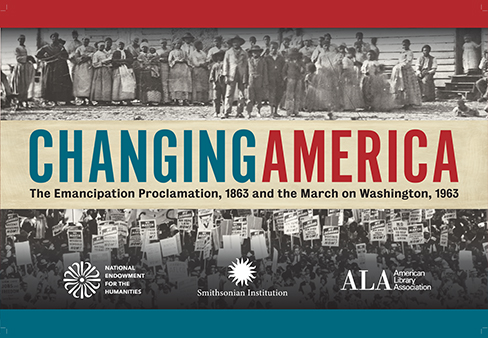Changing America: The Emancipation Proclamation, 1863 and the March on Washington, 1963

Exhibit Open - August 4 - September 9, 2016
Changing
America: The Emancipation Proclamation, 1863, and the March
on Washington, 1963,
is a traveling
exhibition which examines the relationship between
two great people's movements that resulted in the
Emancipation Proclamation in 1863, and the March on
Washington in 1963.
Both grew out of decades of bold actions, resistance,
organization, and vision.
One hundred years separate them, yet they are linked in a
larger story of liberty and the American experience – one
that has had a profound impact on the
generations that followed.
The dramatic story of how these two pivotal events came into
being, a century apart, and how each helped put the nation
on a course toward fulfilling its commitment to liberty and
justice for all, is one that can inspire all Americans.
Decades of work, struggle and sacrifice by many dedicated
individuals and groups preceded both of these events. The
exhibition tells the story of these struggles and their
impact on American history and on the extension of equal
rights to all Americans.
Emancipation from slavery was not the product of one act but
of many. In the
19th century, enslaved and free Americans chipped
away at slavery through daily acts of resistance, organized
rebellions, and political pressure on politicians, generals,
and the U.S. government.
Finally, on September 22, 1862, Abraham Lincoln
issued the preliminary Emancipation Proclamation, which
ordered that as of January 1, 1863, all enslaved individuals
in all areas still in rebellion against the United States
"henceforward shall be free," and under the protection of
the military.
The Emancipation proclamation was limited in scope and
revolutionary in impact. It committed the nation to ending
slavery. The U.S. Congress responded with Constitutional
amendments abolishing slavery, expanding citizenship rights,
and giving black men the right to vote.
These acts changed the political landscape, but the
new freedoms were stripped away in the following years.
However, on each Emancipation Day anniversary, Black
Americans organized parades and speeches reminding the black
community and the entire nation of a commitment that
remained unfulfilled.
These local Emancipation Day celebrations and many other
actions set the stage for the national push for freedom in
the 20th century. On August 28, 1963, an estimated 250,000
Americans gathered at the Lincoln Memorial in the District
of Columbia to mark the 100th anniversary of the
Emancipation Proclamation. People traveled from every state,
united across race, class, and ideological lines, and
representing organizations, unions, churches or simply
themselves. The prayers, electrifying speeches, and stirring
music of that day served to remind Americans of the nation’s
commitment to fulfill its founding principles of liberty and
equality for all.
In the months following the march, demonstrations and
violence continued to pressure political leaders to act. The
Civil Rights Act of 1964 and the Voting Rights Act of 1965
were turning points in the struggle for equality. The bills
outlawed segregated public facilities and prohibited
discrimination in employment and voting. The success of the
March on Washington and the achievements of the modern
struggle for civil rights have provided a lasting model for
social change.
Changing America: The Emancipation Proclamation,
1863 and the March on Washington, 1963
is presented by the Smithsonian's National Museum of African
American History and Culture and the National Museum of
American History in collaboration with the American Library
Association Public Programs Office. The exhibition is made
possible by the National Endowment for the Humanities (NEH)
and is part of NEH's
Bridging Cultures initiative, "Created Equal: America's
Civil Rights Struggle,"
which brings four outstanding films on the civil rights
movement to communities across the United States (see
http://createdequal.neh.gov).
"Created Equal"
encourages communities across the country to revisit and
reflect on the long history of civil rights in America.


